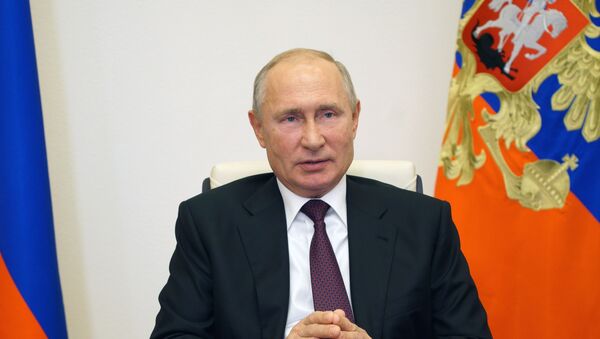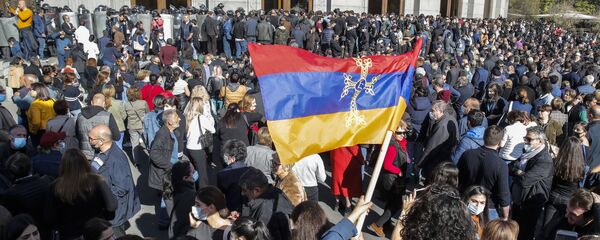Speaking to journalists on Tuesday, Russian President Vladimir Putin said that the return of several Karabakh districts to Azerbaijan, which is stipulated by the recently inked ceasefire, has been on the table for quite a long period of time.
"Frankly speaking, the issue of returning to Azerbaijan five, and then two regions, which were actually under the control of Armenia has been on the agenda for a long time," Putin said as aired by Rossiya 24 broadcaster.
Yet, the issue of transferring the city of Shusha under Azerbaijan's control had never been discussed before and it arose during the latest armed conflict between Yerevan and Baku, Putin added.
He went on to comment that even Armenia did not recognise the independence of the self-proclaimed republic, adding that Baku was trying to take back its territories.
The Russian president referred to the situation in Nagorno-Karabakh before the fighting ended as critical, stressing that it had been impossible to conduct negotiations within the framework of the OSCE Minsk Group.
What is currently of primary importance, Vladimir Putin noted, is that the deal put an end to the bloodshed, while the return of refugees into the disputed zone is entrusted to Russian peacekeepers. "This is the most important thing right now", the Russian president asserted.
Turkey Never Hid Azerbaijan Bias in Karabakh Standoff, President Putin Notes
"As for Turkey's role, it is well-known, Azerbaijan addressed it directly and Turkey never hid it — they unilaterally supported Azerbaijan," Putin told the journalists, adding Turkey's clout in Azerbaijan was "a geopolitical consequence of the Soviet Union's collapse."
Crediting Russia with convincing Turkey not to send troops to the conflict zone, Putin pointed out that Turkey’s actions could be viewed from different angles, "but you can hardly accuse Turkey of violating international law," the president remarked.
He said that a refusal from Armenia to sign the trilateral deal on Nagorno-Karabakh "would have been suicide" for Armenians and that Armenian Prime Minister Nikol Pashinyan accurately described the situation in his address to the nation a day prior to the
"I have nothing to add. He said the whole truth," Putin said.
At the same time, the president proceeded, Moscow did everything in its power not to let Yerevan feel abandoned while paying a special attention to the balance of power in the fractious region.
"We proceeded from the fact that even in the course of such serious events a balance must be maintained ... And I assure you that Armenia did not feel abandoned, forgotten. Russia did everything to prevent this from happening," Putin said.
Military clashes intensified in the Nagorno-Karabakh region in late September after Azerbaijan and Armenia accused each other of violating the decades-long ceasefire along the line of contact. After two failed attempts to end the fighting and thousands of people killed, including civilians, the sides finally brought an end to military hostilities by signing a joint statement mediated by Russia on 10 November.
Decades of Tensions in Karabakh
Tensions had been on and off in the Armenian-dominated region since 1987 and years later, the region proclaimed itself as an independent republic amid the breakup of the Soviet Union in 1991.
Between 1992 and 1994, Yerevan and Baku fought a brutal war for the territory that took the lives of over 30,000 people and displaced at least 1.1 million others. Thousands more have been killed in the subsequent flare-ups.



